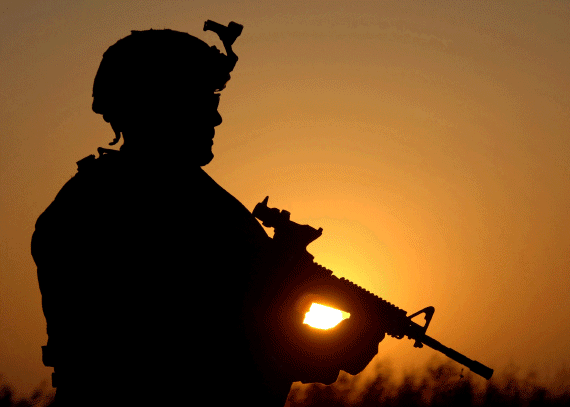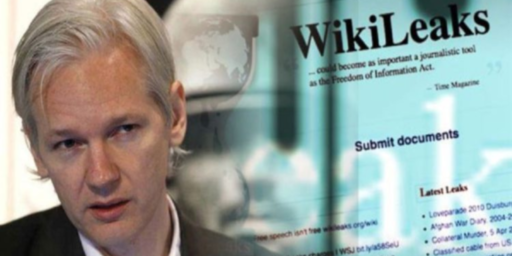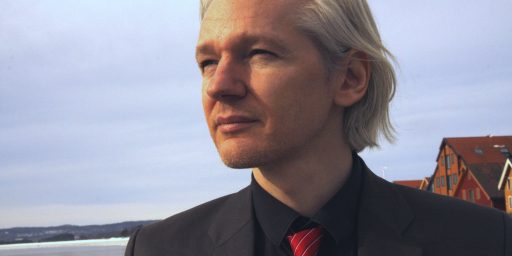Why Won’t Pentagon Help WikiLeaks?
Glenn Greenwald asks, "Why won't the Pentagon help WikiLeaks redact documents?" For the same reason we don't negotiate with terrorists.
Glenn Greenwald asks, “Why won’t the Pentagon help WikiLeaks redact documents?”
At the very least, WikiLeaks clearly indicated its willingness to have government officials review the documents and make recommendations about redactions — something those officials refused to do.
Exactly the same thing is happening now concerning the 15,000 remaining documents which WikiLeaks originally withheld in order to engage in “harm minimization.”
[…]
Why would the DoD refuse to offer this assistance? WikiLeaks — in response to Pentagon threats — has already stated emphatically that these documents are going to be released no matter what. No rational person would doubt that they mean this. Wouldn’t it be vastly preferable — from the Government’s perspective — to have those documents released with the names of Afghan sources redacted, rather than force WikiLeaks to guess at what needs to be withheld? The Pentagon routinely conveys to media outlets preparing to release classified documents its views about what specifically ought to be withheld, notwithstanding its objections to the release of all information. Why would they not do the same here?
After the last release, the Pentagon very flamboyantly accused WikiLeaks of endangering the lives of innocent Afghans, even accusing them of having “blood on their hands” (despite the absence of a single claim that anyone was actually harmed from the release of those documents). If Pentagon officials are truly concerned about the well-being of Afghan sources identified in these documents — rather than exaggerating and exploiting that concern in order to harm WikiLeaks’ credibility — wouldn’t they be eager to help WikiLeaks redact these documents? That would be the behavior one would expect if these concerns were at all genuine.
Sean Paul Kelley takes it a step further: “The blood, if there is to be any, is on the Pentagon’s hands. It’s that simple.”
No, I don’t think so.
I’m reminded of this bit from the classic “What have the Romans ever done for us” sequence in Monty Python’s Life of Brian:
Reg: We’re giving Pilate two days to dismantle the entire apparatus of the Roman Imperialist State and if he doesn’t agree immediately we execute her.
Matthias: Cut her head off?
Francis: Cut all her bits off, send ’em back every hour on the hour… show him we’re not to be trifled with.
Reg: Also, we’re demanding a ten foot mahogany statue of the Emperor Julius Caesar with his cock hanging out.
Stan: What? They’ll never agree to that, Reg.
Reg: That’s just a bargaining counter. And of course, we point out that they bear full responsibility when we chop her up, and… that we shall not submit to blackmail.
Note that in the AP piece (“Informant says WikiLeaks suspect had civilian help”) that Greenwald cites, NYT reporter Eric Schmitt says, “I certainly didn’t consider this a serious and realistic offer to the White House to vet any of the documents before they were to be posted, and I think it’s ridiculous that [WikiLeaks founder Julian] Assange is portraying it that way now.” Why? He doesn’t say and AP’s David Dishneau apparently didn’t ask.
There are two possible, not mutually exclusive, answers that come to mind.
First, I gather from the comments at Kelley’s place — but can’t find independent corroboration — that Assange only gave ISAF 24 hours to review the 80,000-odd documents. If so, it’s an absurd gesture.
Second, Assange may simply have understood that the Pentagon was not going to legitimate the criminal release of classified information by cooperating in its release. It’s the same reason we don’t negotiate with terrorists: Doing so invites more of it. There’s pretty good reason to believe that this is their view.
Regardless, the Defense Department was safeguarding these documents. They were stolen, in violation of federal law and human decency, by an individual or individuals betraying a sacred trust. The Pentagon demanded that the documents not be released, warning of dire consequences. If those consequences occur, the blood is most assuredly not on their hands.
UPDATE: In comments, Greenwald notes that I glossed over the fact the government routinely cooperates in this fashion with major media outlets who are about to publish classified material. Fair enough.
While I’m not privy to the decision-making process, my guess is that the difference is that the government sees the New York Times, Washington Post, and CBS News as both vital parts of the system and, at the end of the day, good faith actors. By contrast, Assange and his gang exist solely to undermine the system. Indeed, while the NYT would reasonably be expected to not publish names the Pentagon asked be redacted, WikiLeaks might very well use this information to highlight the juicy bits. There is, therefore, much less incentive to cooperate.




“Assange may simply have understood that the Pentagon was not going to legitimate the criminal release of classified information by cooperating in its release.”
Yeah. The whole thing strikes me as, “Well, you know, we offered…but they refused. So, there.”
Bad faith.
As I said in the part you quoted – and I don’t think it’s in doubt — the Government routinely gives exactly this advice/assistance to newspapers which are preparing to publish classified information which someone in the government “stole.”
They’ll say: “We don’t think you should publish any of this. It was criminally given to you. But if you do, we especially want you to withhold X, Y and Z, because publishing that will cause serious harm.”
What’s the difference?
And if the Pentagon cares about Afghan sources as much as it claims (when trying to discredit WikiLeaks), how can it be morally justified for them to pass up the opportunity to help protect them?
Truth of the matter, it’s all in the Army’s hands, the expertise is in the Air Force and Navy and Army just does not want their “assistance.” And all the “Joint” fellows, your guess is as good as mine for why no action.
The difference is that the Pentagon actually trusts the NYT to do as such, and to report it fairly. Assange, on the other hand, has never really made any bones about the fact that he’s using the information to undermine the occupation of Afghanistan and Iraq (witness the helicopter shooting video a while back, and how wikileaks edited it).
“It’s the same reason we don’t negotiate with terrorists: Doing so invites more of it.”
Incorrect.
You are right that if terrorists, for instance, take hostages, it makes sense not to negotiate with them since that would encourage them to take hostages again in the future.
However, WikiLeaks is not threatening to release the documents in order to blackmail the Pentagon. Releasing the documents is their primary aim. Terrorists take hostages in order to achieve some other goal.
WikiLeaks will make public whatever documents they obtain regardless of what the Pentagon does here. That’s their objective. Comparing them to terrorists is inflammatory and incoherent.
“By contrast, Assange and his gang exist solely to undermine the system.”
First of all, the use of the term “gang” is not terribly useful to a rational discussion. You’re stacking the deck. But let’s put that aside.
In what way does WikiLeaks seek to “undermine the system” that differs from mainstream news organizations that release illegally-obtained classified information?
“Indeed, while the NYT would reasonably be expected to not publish names the Pentagon asked be redacted, WikiLeaks might very well use this information to highlight the juicy bits.”
But what is your reasoning for believing that WikiLeaks *would* do this?
Honestly, if the Pentagon attempted to assist WikiLeaks, and WL turned around and used the information to “highlight the juicy bits”, that would definitively prove to the world that WL is a bad actor and absolve the Pentagon of any guilt while doing virtually nothing to put covert sources in any additional danger (above what they would have been in if their name was released without being “highlighted”).
It’s a win-win for the Pentagon, as far as marginalizing WikiLeaks (for instance, I’m generally supportive of WL, but if they acted as you suggest, my opinion would change dramatically). If they actually believe (without any evidence) that WL would act this way, they should absolutely allow WL to hang themselves with this rope.
This is really quite simple. The Pentagon doesn’t want to give the perception of anyone having the upper hand on them (particularly a small nonstate actor). They want to project an image of omnipotence; that’s understandable. However, it’s quite clear that WikiLeaks *does* have the upper hand in this case. The Pentagon’s chest-puffing is completely hollow and unconvincing.
Still, I can understand why they wouldn’t wish to be seen as “playing by the rules” of a much less powerful agent. They should simply ask a third party – perhaps a former Pentagon employee with knowledge of the documents – to “independently” reach out to WikiLeaks to assist them in redacting the names.